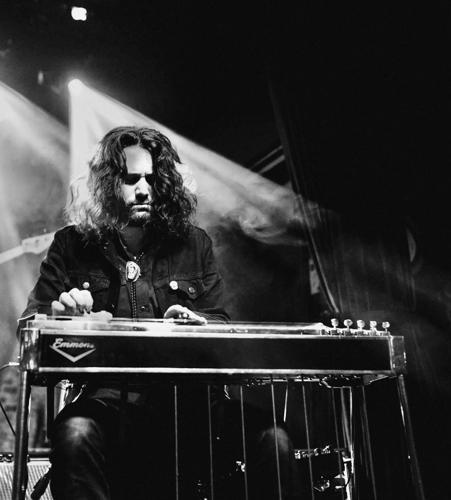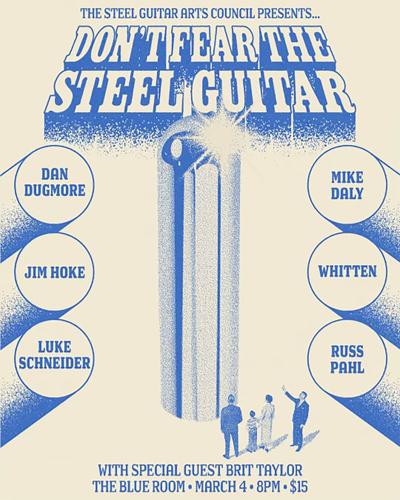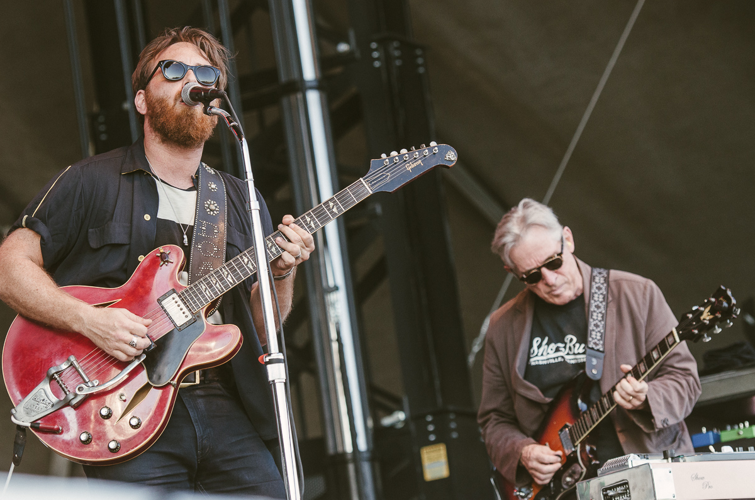
Luke Schneider
Synonymous as pedal steel is with Nashville music, new permutations of the instrument abound beyond its iconic role as a sonic accoutrement for country records. There are plenty of steel-gazers about town, who are both maestros in classic approaches to the instrument and working to expand the way people think of it. Among them is Russ Pahl, a Minnesotan who moved to town in ’85 and who turns 70 this year; his recent credits include records by Dan Auerbach, T Bone Burnett and Kacey Musgraves. There are also relative young bucks Luke Schneider (age 43), and Whit Wright (37). Schneider you might know in many different ways, including as an erstwhile member of Margo Price’s band, a contributor to The Rectangle Shades — the country-psych concern of John Davis from Superdrag — or the solo firebrand behind 2020’s masterful Third Man Records LP Altar of Harmony. When he’s not collaborating with Schneider’s TMR labelmate and fellow soundscaper Rich Ruth or touring with country singers like Joshua Hedley or Thomas Rhett, Wright issues solo work as Whitten.

Russ Pahl (right), playing a guitar with an unusually small number of strings alongside Dan Auerbach in The Arcs, Pilgrimage Festival 2016
Last year Schneider curated Chrome Universal, an installment in indie label Tompkins Square’s Imaginational Anthem series, featuring players who apply a rainbow array of approaches to pedal steel that highlight the instrument’s beauty and its viability as a vessel for far-out sound. Several of them joined him at The 5 Spot on the final night of AmericanaFest for a showcase, which planted the seed for semi-regular happenings. Say hello to the newly christened Steel Guitar Arts Council, a loose coalition of players with a huge range of perspectives. The group’s inaugural gala takes place Saturday at The Blue Room, with solo sets from Pahl, Wright and Schneider, as well as fellow Nashville steel aces Mike Daly, Dan Dugmore and Jim Hoke. Singer-songwriter Brit Taylor, who just released her LP Kentucky Blue — co-produced by Sturgill Simpson and David Ferguson, whose projects together include Margo Price’s That’s How Rumors Get Started — will play as well.
Ahead of the show, the Scene caught up with Pahl and Schneider in separate phone conversations. Below is a portion of our talk, woven into one discussion for ease of reading.
How did pedal steel become part of your life?
Russ Pahl: I’d been playing guitar in this country trio at this tavern my dad took me to, a bit west of Minneapolis. I was just 12 years old then. [Laughs] One night, this guy who came through on tour told me I was playing the wrong instrument. Afterward, I hung around and he showed me some licks on pedal steel. Turned out that guy was Ralph Mooney, who’d played with Buck Owens. That’s how I got started.
Luke Schneider: Playing in Natural Child, and with Lambchop. … Weird, ambient New Age is my favorite thing to do. But I also love playing with singer-songwriters.
Russ, when did you land in Nashville, and what was it like then?
RP: 1985. Got my first 10,000 hours playing country, disco and polka in the clubs of the Twin Cities in the ’70s and early ’80s, then my second 10,000 in the studios here. [Laughs] I had to get out of Minnesota because playing pedal steel I was kind of the top dog — which is no good, because you need people who are better than you if you want to get better. It was the mid-1980s and things were rocking, hard. The whole Nashville Network was screaming. TV shows to play on. Publishing demos. A lot of playing. A lot of recording. But if you had a rock band, there was no place for that — you went to New York or L.A. Thinking like a guitarist, basically, kept me working. I respect the steel-guitar greats — Lloyd Green, Paul Franklin — but also love guys like Andy Summers from The Police, that whole tone-generating side of things.

Is Nashville the national capital of steel guitar?
RP: Absolutely. There’s at least 50 or 60 proficient players here. Luke, Whit and I are trying to create a space for people who want to express themselves with the instrument. This is not your dad’s steel guitar anymore.
LS: I would say there’s at least a couple hundred.
How did the Steel Guitar Arts Council come to be?
RP: The show last fall at 5 Spot was when we decided to create an alliance — to promote shows, encourage players here to fly their freak flag and do stuff they wouldn’t otherwise do at a traditional, rearview-gazing steel-guitar gig … and ultimately get some higher-profile guys who’ve taken the instrument to interesting places — like Daniel Lanois — involved. I’m an old hippie, and this is a happening. Bring clean bong water.
LS: Russ keeps up with outside-the-box things people are doing. It’s cool to be a part of his vision, and to network with the many other steel guitarists he’s met along the way. We all love classic country music, but the point of this … is to focus less on the past, and more on new directions the instrument can be taken.







